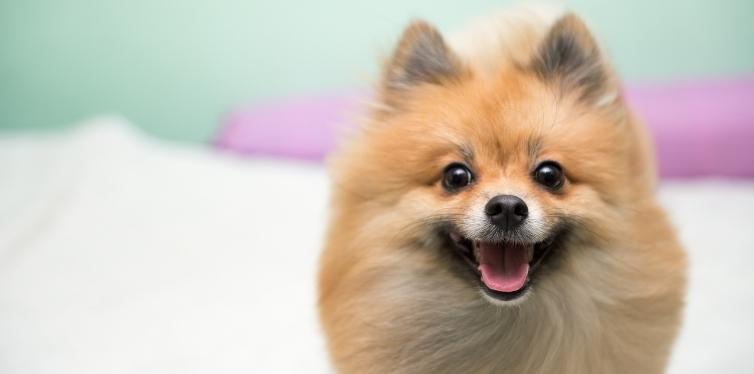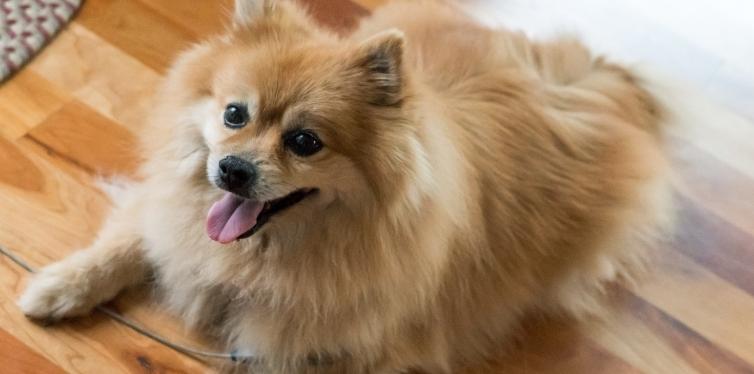Has your Pomeranian ever scared you with the way they pant after running around the house? As a whole, Pomeranians tend to breathe through their mouth a lot, but sometimes they might seem more out of breath than usual. Thank might prompt you to think about asthma.
So, can Pomeranians get asthma? While asthma is more common in cats, it can affect dogs as well. Since small dog breeds are more likely to develop this disease than large ones, your Pomeranian can get an asthma attack under the right circumstances.
So, how can you tell that your Pomeranian has asthma, and can you prevent it? Even though they’re not considered a hypoallergenic dog breed, they can certainly get dog allergies themselves. Keep on reading to find out more.
How to Tell Asthma and Normal Panting Apart?

Asthma in Pomeranians isn’t that different from asthma in humans. It’s an allergic reaction of the organism to an allergen in the environment. This allergen causes inflammation, which narrows/blocks your Pomeranian’s airways.
Typical allergens that might cause asthma attacks in Pomeranians are:
- Smoke from stoves, candles, cooking
- Cigarette smoke
- Pollen
- Air pollution
- Household cleaners
- Cosmetics
- Mold spores
- Pesticides
- Air fresheners
- Perfumes and deodorizers
- Cat litter particles
What happens during an attack caused by an allergic reaction is that your Pomeranian has trouble getting enough air through those constricted airways. So, they might pant or breathe heavily in an attempt to get more air into their lungs. They’ll even breathe heavily while sleeping.
Unfortunately, it’s difficult to recognize mild symptoms of asthma because Pomeranians tend to pant. Happiness, excitement, activity, or hot weather – all these can make your Pomeranian pant heavily for a short time.
Sometimes owners get so used to seeing their Pom out of breath after exercise that they ignore excessive panting without a reason. But you have to remember that excessive panting isn’t normal for a Pomeranian of any age and could be caused by other things than allergic reactions.
To determine if your Pomeranian is simply hot/exhausted or breathing fast, look for the following signs:
- Panting heavily and longer than usual
- Extreme expansion and contraction of the chest muscles
- Wide mouth breathing
- Coughing and wheezing
- Loss of appetite and lack of energy
- Fatigue
Besides these signs, look at your Pomeranian’s gums. Healthy gums are pink. While red gums are a sign of dental disease, blue gums are an indication that your Pomeranian lacks oxygen due to an excessive buildup of mucus and phlegm.
The harder it is for your Pomeranian to breed, the more likely they are to panic and freak out. In these situations, you have to handle your Pomeranian carefully because they might bite out of fear or run blindly to hide somewhere.
If you notice any of these signs, I recommend that you bring your Pomeranian to the vet for an examination and an x-ray. Severe attacks are dangerous and should be handled by a professional.
You can also take a video of how your Pomeranian is panting and send it to your vet if you aren’t sure and don’t want to stress your Pomeranian. Your vet will be able to tell you if your Pomeranian is having an asthma attack or they’re merely over-exhausted.
How to Treat Asthma in Pomeranians?

Sometimes asthma is hard to diagnose in Pomeranians since it can be difficult to determine their exact allergic reactions. That’s because the x-rays might not show anything amiss if your Pomeranian isn’t having an acute attack. So, it’s important to bring your Pom to the vet as soon as you notice that they’re having trouble breathing or even breathing too fast.
Depending on the severity of the asthma attack, your Pomeranian might need an oxygen cage to help them breathe, an epinephrine injection to reduce the swelling in the lungs, and an IV to deliver fluids and medications.
To treat asthma in dogs, veterinarians use several drugs:
- Bronchodilator to relax your Pom’s bronchial muscles and clear the airway.
- Antihistamine to reduce the allergic reaction.
- Steroids to reduce the inflammation in your Pomeranian’s lungs and airways.
Your vet will be the one to decide which types are the most suitable ones for your Pomeranian and write you a prescription. You won’t be able to get some of these drugs without one.
Don’t worry if your Pomeranian has asthma. They can lead a full life, but you’ll have to follow your vet’s instructions to the letter. Likely you’ll have to give oral pills or use a nebulizer if your Pom has an asthma attack. While oral pills might be easier to administer, nebulizers are more effective.
A nebulizer is something like an inhaler, and it converts liquid medication into a mist that your Pomeranian has to inhale. It delivers the medication quickly to the lungs and lessens the chance of unwanted side effects. Your vet can show you how to use it.
Don’t try to use human asthma medication if you happen to have some lying around the house. Pomeranians are so small that even the wrong dose of a prescribed medication might do more harm than good. Furthermore, human asthma medication is highly toxic to dogs.
How to Prevent Asthma Attacks in Pomeranians

Now that you know that your Pomeranian can have asthma, you’re probably wondering how you can prevent asthma attacks. It can be quite scary watching your Pomeranian struggle for breath, and it’s not an experience you’d want to repeat.
One thing you can do is have your Pomeranian tested for dog allergies. Then it’s a matter of avoiding these allergens as much as possible. It won’t be possible all the time, but you’ll have to make an effort.
In addition to this, you can take the following preventive measures:
- Don’t smoke around your Pomeranian, don’t burn candles, or light a fireplace. Smoke is full of irritants that can inflame and narrow your Pom’s airways.
- Get a HEPA air filter to purify the air.
- Wash your Pomeranian’s bedding regularly.
- Use a no-pull dog harness whenever you walk your Pomeranian.
- Avoid using chemicals to clean floors and tiles. Use white vinegar diluted with water.
- Clean your Pomeranian well after a walk to remove allergens.
- Think about getting rid of the carpets.
- Switch to dust-free cat litter if you have cats.
- Avoid wearing cosmetics and perfumes with a strong scent.
Besides these steps, you should always have your Pomeranian’s medication when you go for a walk or a trip since something could trigger allergies in your Pom.
What Other Diseases Cause Difficulty Breathing?

As I already said, asthma can be tricky to diagnose in Pomeranians at times. Other diseases have similar symptoms, and your vet has to rule them out.
Let’s see what other conditions cause panting and breathing difficulties in Pomeranians.
1. Heartworms
Heartworms are parasites that attack the heart, lungs, and blood vessels. These worms can cause heart failure and lung disease. Often, the first noticeable symptom is a persistent cough, fatigue, and weight loss.
Fortunately, heartworms are easy to prevent with the right medication but difficult to treat once they reproduce inside your Pom’s heart and lungs.
Mosquitoes are the main carriers of these parasites, and they spread almost everywhere in the world. As such, you should take preventive measures.
2. Infections
Bacterial or viral infections are another common reason for breathing problems in Pomeranians. Whenever an infection attacks your Pom’s upper and lower respiratory tract, it can change how your Pomeranian breathes.
Unfortunately, some infections might lead to pneumonia and a build-up of fluids in the lungs. These are serious, so you should bring your Pomeranian to the vet if you suspect that they have a cold.
Kennel cough is also a common bacterial infection that makes your Pomeranian cough persistently.
3. Collapsed Trachea
If your Pomeranian has a “honking” cough, your vet might suspect a collapsed trachea. This condition is common in Pomeranians and can cause airway obstruction. Whenever you walk your Pom, you should use a no-pull dog harness instead of a collar.
Besides persistent cough, a collapsed trachea also leads to heavy breathing, exercise intolerance, and bluish gums. It can be treated with medication to suppress the cough, but surgery might be necessary in severe cases.
Closing Thoughts
You should now know that Pomeranians can certainly get asthma and even humans can be allergic since they’re not considered hypoallergenic dogs. So, you have to get your Pomeranian to the vet if you notice any sudden changes in their breathing even if your Pomeranian is breathing heavy while sleeping. Remember that it might not be asthma but something much more serious.





